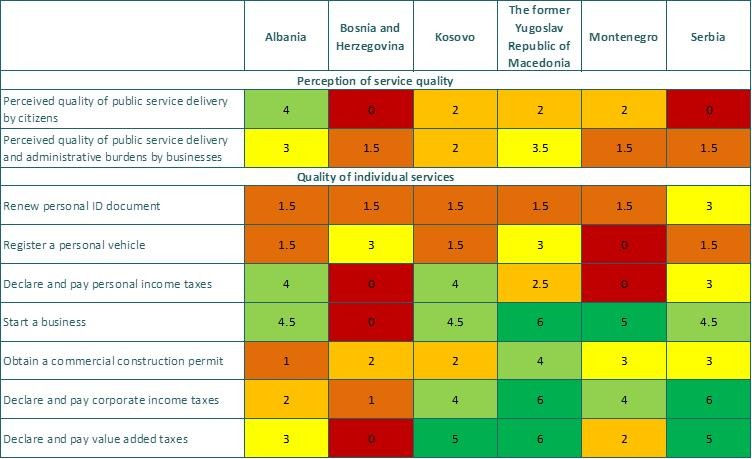What can we learn from SIGMA assessments about service delivery in the Western Balkans
- Juhani Lemmik

- Jul 29, 2020
- 3 min read
Updated: Nov 12, 2020
There is not (yet) an uncontested regional leader
SIGMA published its assessment reports in the Western Balkans and Turkey in the beginning of 2018. They are based on SIGMA Principles of Public Administration, covering areas such as Strategic Framework for Public Administration Reform, Policy Development and Co-ordination, Accountability, Civil Service Reform, Public Financial Management and Service Delivery. The 2017 assessments used for the first time a comprehensive indicator framework, which allowed to diagnose the current state of play both in terms of regulatory framework, as well as implementation of reforms in practice.
In the area of service delivery there are four principles that frame the normative expectations towards the state in developing administrative services such as delivering licenses and permits, but not ‘genuine’ public services such as health care or education. These are the services governed by administrative procedures, which should guarantee certain rights, such as the right to explanation behind a decision or the right to appeal the decision, to citizens as users of these services. In the background, there is a set of technical and organisational enablers, such as data exchanges between registries or electronic identity management solutions, that make it possible to offer these services efficiently and in a user-friendly manner, both over-the-counter, as well as electronically.
SIGMA looked at a ‘basket’ of services in six countries (ALB, BiH, KOS, MKD, MNE and SRB) and observed that most of countries have not yet impressed their citizens with good service delivery, as perceived quality of administrative services, both by citizens, as well as businesses, is rather low (see table below). An exception here is Albania which has made a great effort in improving service delivery through one-stop shops (ADISA service centres), and visibly and tangibly improved the service experience for citizens. Prime Minister Edi Rama, the driving force behind the reform, got re-elected in spring 2017 to continue with reforms.
MKD is another notable example of concerted and deliberate effort to improve service delivery for businesses. Its Doing Business ranking 2018 is whopping 11th position: starting a business is really easy and plenty of intermediaries (accountants, lawyers etc.) are available to do it for the client; declaring and paying taxes is easy as well; and dealing with construction permits has been fully digitalised (no paper-based applications any more!).

In general, however, there is a sense that business-related services are more advanced and consequently more highly appreciated than citizen-related services. Almost all the countries had declared in the public administration reform plans better service delivery as one of the priority areas and all of them have adopted recently laws on general administrative procedure. Nevertheless, progress has been slower than expected.
One of the reasons has been poor uptake of digital government technologies. Two most notable are less than optimal utilisation of interoperability between registries, sometimes accompanied with low quality of digital data in these registries. The other has been cumbersome and/or costly access to means of authentication and digital signature, which hinders digital uptake. While the first problem is due to resistance to change and lack of strong mechanisms and capacity to push reforms through, the other is due to sub-optimal business models where low uptake dictates high prices and that, in turn, determines low uptake. Government-led partnership with main players naturally interested in higher uptake of digital services, telecoms and banks, could be a way forward in order to keep the prices down, at the same time boosting the opportunities to use the digital signature across sectors and services. Also, investing in education in digital skills across the population should be a joint public-private initiative, because returns would be quick and widespread.
Repeating the assessment exercise in 3 years may not reveal great success across the Western Balkans. If one country were to be betted on to become the universal leader in terms of results, that would be Albania due to its clever and systematic implementation of service delivery strategy. But the good news is that other countries can still make progress against their own baseline and put things right in terms of institutional and policy configuration. And as a word of encouragement, perhaps throwing the political weight on the service delivery reform can win more elections.
Add media to your posts
When creating your posts you can:
Upload images or GIFs
Embed videos and music
Create galleries to showcase a media collection
Customize the look of your media by making it widescreen or small and easily align media inside your posts.
Hashtag your posts
Love to #hashtag? Good news!
You can add tags (#vacation #dream #summer) throughout your posts to reach more people. Why hashtag? People can use your hashtags to search through content on your blog and find the content that matters to them. So go ahead and #hashtag away!









Comments